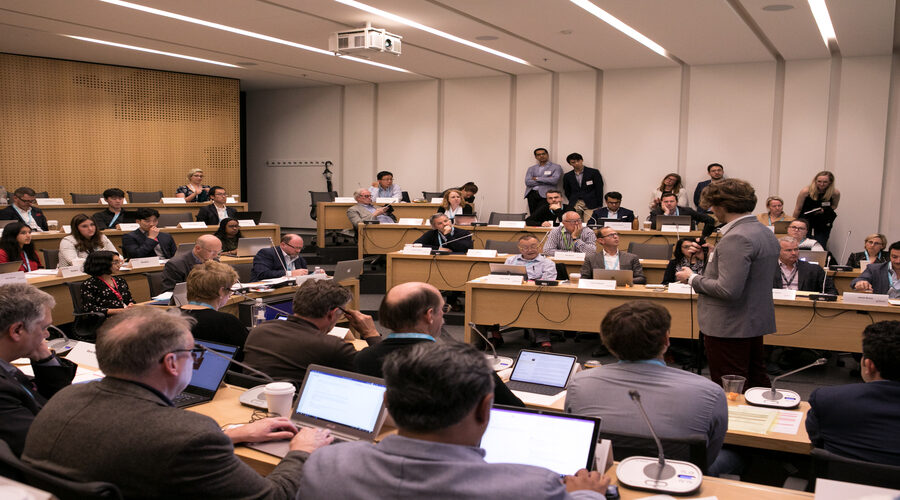
Shabaka Gibson, an experienced leader in economic, community, and business development, and an Army veteran, has joined the Creative Destruction Lab – Wisconsin (CDL-Wisconsin) team as its new director.
CDL-Wisconsin delivers mentoring for massively scalable, seed-stage, science- and technology-based startups focused on risk management and insurance, and health and wellness. It is a partnership between the UW-Madison School of Computer, Data & Information Sciences (CDIS) and the Wisconsin School of Business (WSB). The strategic hire of Gibson will extend UW-Madison’s position as a key player in entrepreneurship efforts.

Gibson joined CDL-Wisconsin on June 21, 2021, bringing 20 years of comprehensive business and technical expertise to the table. Prior to working with CDL-Wisconsin, Gibson worked as the vice president of Battle Creek Unlimited, where he developed and implemented a food innovation district strategy for Battle Creek, MI. Before his experience with Battle Creek Unlimited, he served as the senior vice president of Ady Advantage, an economic development consulting firm with projects across the United States and Canada focused on research, strategy and marketing.
He also previously served ten years in the U.S Army Reserves as a military intelligence officer. Gibson holds a bachelor’s degree in political science from Western Michigan University, a master’s degree in public policy from the University of Chicago, and a doctorate of business administration from the University of Maryland Global Campus.
“We are thrilled to have Shabaka Gibson as part of the CDL-Wisconsin team,” says Tom Erickson, CDIS founding director. “His extensive experience advances our mission of accelerating innovative entrepreneurship endeavors throughout Wisconsin and beyond.”
“Shabaka is the right person to lead CDL-Wisconsin as we build on the success of our inaugural year and plan for significant growth in the years ahead,” adds Joan Schmit, American Family Insurance Distinguished Chair in Risk Management and Insurance at WSB. “His background and expertise is well-suited to advance CDL-Wisconsin, drive growth among our participating startups, and spur regional innovation.”
CDL-Wisconsin launched in the fall of 2020 with a program focused on startups in risk, and has already made an impact providing support for several ventures. These include Wisconsin-based ventures PythonicAI and Last Lock, both of which are led by UW-Madison alumni and contribute to an ever-growing startup culture in Wisconsin. In September 2021, CDL-Wisconsin will accept a second cohort of risk ventures and its inaugural group of health & wellness ventures.
As director, Gibson’s focus is on growing CDL-Wisconsin, reaching more startups and creating more resources for entrepreneurship communities within the university, city, and state, with the primary goal to fuel the economy in Wisconsin and beyond.
“The economy is at it’s best when we are able to energize and support technology-based start-ups that can grow and compete on a global scale,” Gibson says. “This creates jobs, tax revenue, and other positive outcomes for society. I am honored to join the great team at CDL-Wisconsin and look forward to helping drive entrepreneurial success.”
Applications for CDL-Wisconsin are now open. Learn more and apply by visiting: www.creativedestructionlab.com/apply
Questions about CDL-Wisconsin? Email cdl-wisconsin@creativedestructionlab.com
Creative Destruction Lab (CDL) is a nonprofit organization that delivers an objectives-based program for massively scalable, seed-stage, science- and technology-based companies. Its nine-month program allows founders to learn from experienced entrepreneurs, increasing their likelihood of success. Founded in 2012 by Professor Ajay Agrawal at the University of Toronto’s Rotman School of Management, the program has expanded to ten sites across four countries: Oxford (Saïd Business School, University of Oxford), Paris (HEC Paris), Atlanta (Scheller College of Business, Georgia Institute of Technology), Madison (Wisconsin School of Business, University of Wisconsin-Madison), Seattle (University of Washington, Foster School of Business), Vancouver (Sauder School of Business, University of British Columbia), Montreal (HEC Montréal), Calgary (Haskayne School of Business, University of Calgary), and Halifax (Rowe School of Business, Dalhousie University)